The defense minister of communist North Korea claimed on Thursday that the deployment of the USS Kentucky, a nuclear-powered submarine, to South Korea may prompt the rogue state to launch a nuclear attack.
The belligerent remarks from Kang Sun Nam, published through Pyongyang’s Korean Central News Agency (KCNA), follow last week’s testing of an intercontinental ballistic missile (ICBM) that the United Nations warned could potentially reach nearly every corner of Earth. North Korea has significantly increased its threats of illegal behavior since December when dictator Kim Jong-un closed the year by ordering an “exponential increase of the country’s nuclear arsenal.”
The USS Kentucky arrived in Busan, South Korea, this week. Conservative South Korean President Yoon Suk-yeol, who brokered the deal with leftist President Joe Biden to bring the American asset to his country, toured the vessel on Tuesday and used the occasion to warn Pyongyang that any “nuclear provocation” it decides to execute would result in the “end of the regime.”
Kang’s warning is also the first major statement from a senior North Korean official since a strange incident on the mutual Korean border on Tuesday, in which an American soldier, later identified as Travis King, ran across the border and disappeared into North Korea. American officials have said that, as of Friday morning, Pyongyang has ignored all communications attempting to discuss King’s status, and Washington has no information on his whereabouts or condition.
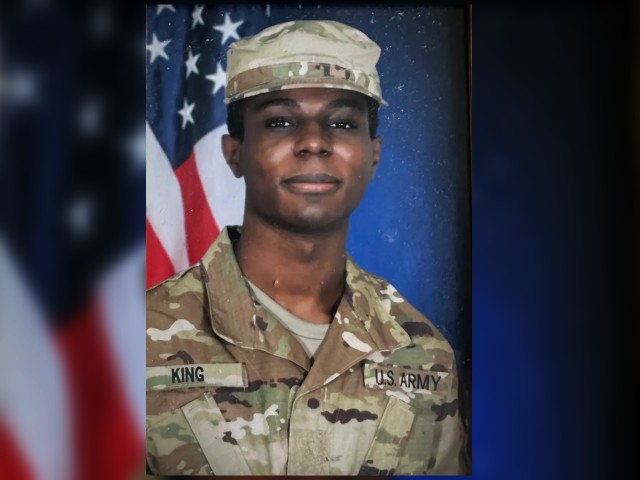
Private 2nd Class Travis King is being detained by North Korea after he crossed the border into the country. (Carl Gates)
Kang did not mention King in his statement, instead focusing on the deployment of the nuclear submarine to the South Korean port city of Busan, the first such visit by an American nuclear submarine since 1981.
“[T]he ever-increasing visibility of the deployment of the strategic nuclear submarine and other strategic assets may fall under the conditions of the use of nuclear weapons specified in the DPRK [North Korea] law on the nuclear force policy,” Kang wrote in his statement. “The DPRK’s doctrine on the use of nuclear weapons allows the execution of necessary action procedures in case a nuclear attack is launched against it or it is judged that the use of nuclear weapons against it is imminent.”
Kang indicated that the Kim regime considers the presence of American nuclear weapons on the Korean Peninsula a reason to fear that the United States would imminently use nuclear weapons on the country.
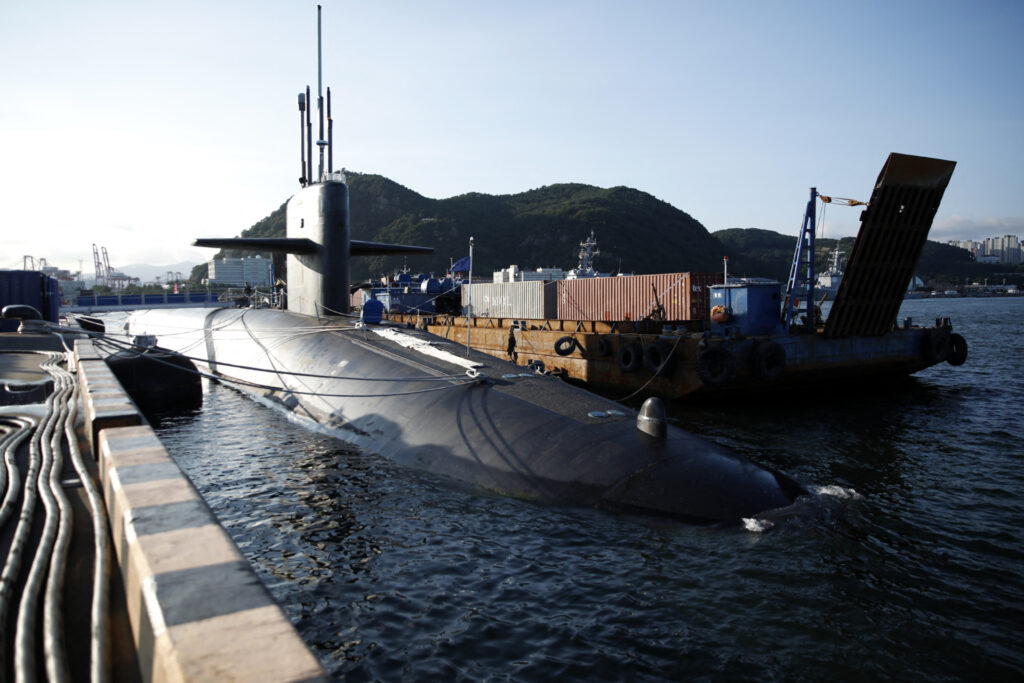
US ballistic missile submarine USS Kentucky is anchored at Busan Naval Base in Busan, South Korea, on July 19, 2023. (WOOHAE CHO/POOL/AFP via Getty Images)
“In particular, the hostile forces posed the most undisguised and direct nuclear threat to the DPRK by bringing an Ohio-class strategic nuclear submarine to the Pusan [Busan] Port operation base,” Kang observed. “This shows that the U.S. scenario for a nuclear attack upon the DPRK and its implementation have entered the most critical stage of visualization and systemization.”
“[T]he phase of a military clash on the Korean peninsula has surfaced as a dangerous reality beyond all sorts of imagination and presumption,” Kang warned.
The administration of President Joe Biden has made no indications that it is seeking to bomb North Korea imminently, focusing most of its foreign policy efforts on the ongoing Russian invasion of Ukraine. Kang’s claim that the presence of the nuclear submarine indicates an imminent nuclear attack, however, echoes the statements from other senior North Korean officials, most prominently Kim Yo-jong, the dictator’s sister.
“Due to the aggressive provocations of the U.S. far beyond its constant military readiness, the situation of the Korean peninsula is now heading toward the threshold of nuclear clash,” Kim Yo-jong said in a statement last week, “and the outbreak of a nuclear war is not hypothetical but is becoming a miserable reality that countries in the Northeast Asian region have to face in the near future.”

Kim Yo-jong, sister of North Korea’s leader Kim Jong-un, attends a wreath-laying ceremony at Ho Chi Minh Mausoleum in Hanoi on March 2, 2019. (JORGE SILVA/AFP via Getty Images)
“The price the U.S. has to pay for its moves against the DPRK will never be low, and I do not conceal the fact that very unlucky things will wait for the U.S.,” she warned.
The South Korean government responded to the North Korean defense minister on Friday by repeating its threat to end the tyrannical, rogue regime in Pyongyang.
“As clearly expressed by South Korea and the United States during the NCG meeting, any nuclear attack of the North against the South-U.S alliance will face the alliance’s immediate, overwhelming and decisive response,” the South Korean Defense Ministry responded. “We strongly warn yet again that such a response will lead to an end of the North Korean regime.”
The NCG is the Nuclear Consultative Group, a platform created by Washington and Seoul to provide South Korea with more agency and information regarding American nuclear assets in the country. The NCG, like Yoon, threatened to “end” the Kim regime in a statement this week.
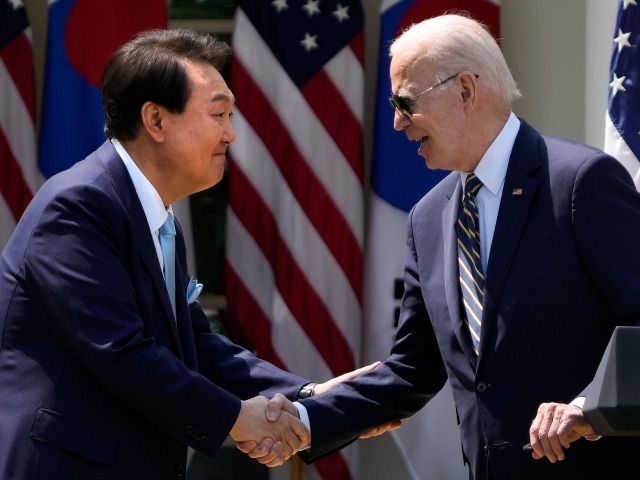
U.S. President Joe Biden and South Korean President Yoon Suk-yeol shake hands during a joint press conference in the Rose Garden at the White House on April 26, 2023, in Washington, DC. (Drew Angerer/Getty Images)
The Pentagon issued a much less aggressive statement asserting that the Kentucky‘s presence in Busan was “prudent” in light of North Korea’s threats and intended to preserve peace, not rekindle war.
Pentagon spokesperson Lisa Lawrence told South Korea’s Yonhap News Agency:
The actions taken by the U.S.-ROK [South Korea] alliance in the Washington Declaration and through the Nuclear Consultative Group (NCG) are a prudent response to the DPRK’s escalatory and dangerous behavior, and further the alliance’s goal of promoting peace and stability in the region.
…
Unlike the DPRK’s actions, U.S.- ROK efforts to improve our defense posture and protect our citizens from overt DPRK threats to use nuclear weapons are not in violation of U.N. Security Council resolutions.
The Koreas have remained in a state of technical war since 1950 when North Korea invaded the South and triggered the Korean War. Seoul’s ally, America, and Pyongyang’s, China, are also technically at war, as the armistice agreement that ended active hostilities in 1953 did not come accompanied by a peace treaty or formal culmination of the state of war. North Korea’s regime regularly threatens nuclear attacks on the South and on the United States and has consistently developed weapons in violation of international law, making its threats realistic. The latest weapon debuted is the “Hwasong-18,” an ICBM Pyongyang apparently tested with success last week.
Complicating the increasingly tense situation between North Korea and America is the case of Travis King, the soldier who ran into North Korea laughing while on a tour of the border “peace village” of Panmunjom on Tuesday. The State Department confirmed on Thursday that it has no information on what happened to King after he ran into the country. State Department spokesman Matthew Miller told reporters that the case was an “extremely high priority” for Washington but declined to offer details.
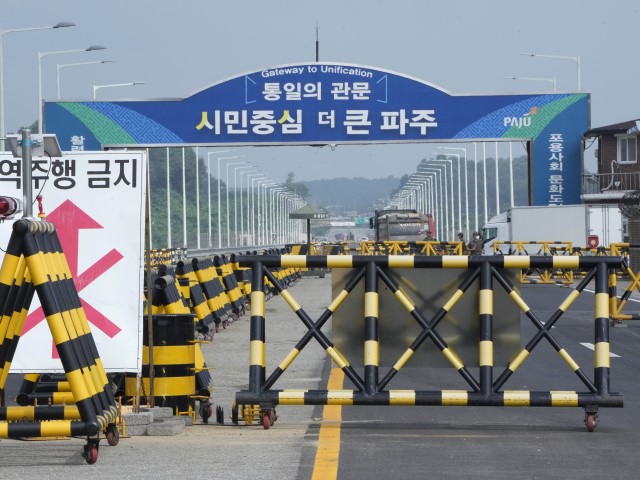
Barricades are placed near the Unification Bridge, which leads to the Panmunjom in the Demilitarized Zone in Paju, South Korea, on July 19, 2023. (Ahn Young-joon/AP)
“All I am prepared to say today is that we have made clear to them, we have relayed messages to them that we are seeking information about his welfare and want him returned safely,” Miller said.
“We don’t know the conditions in which he (King) is living right now and it’s the not knowing that is deeply concerning to us, and we are trying as best as we can to get as much information as we can,” John Kirby, White House strategic communications coordinator, added in a separate media briefing.
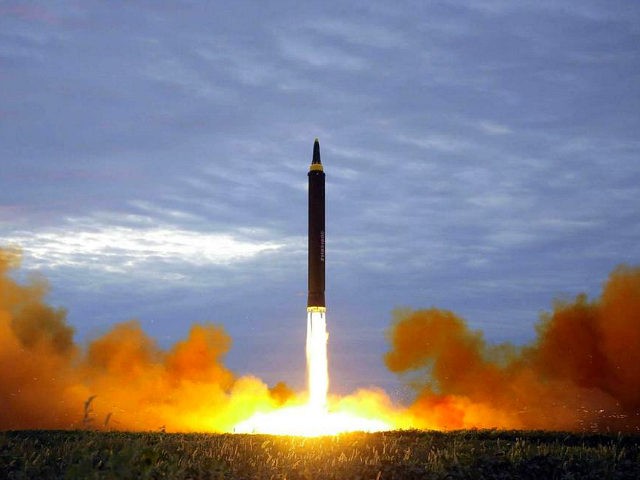
COMMENTS
Please let us know if you're having issues with commenting.